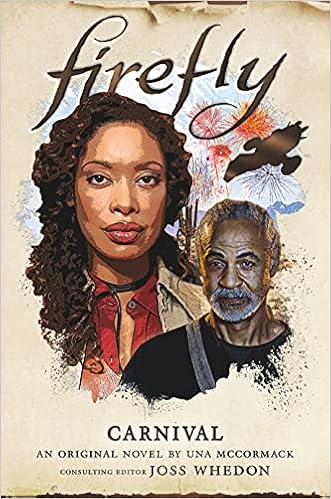
Back when I was a panelist at writing/sci-fi conventions, I would occasionally pop in at the workshops, where pros read/critiqued story submissions and provided a professional’s view. The critiques were honest assessments, often served with actual “pro tips,” but the stories submitted were usually—to be honest—pretty awful.
On one such occasion a pro author/editor I knew provided a critique that was both the shortest I’ve ever heard as well as the definition of “damning with faint praise.”
Her critique: “It’s very nicely typed.”
The newest title in the Firefly novel ‘verse is Una McCormack’s Firefly – Carnival, from Titan Books, and sadly, the best thing I can say about it is that “It’s very nicely bound.”
I’ve complained loud and long about previous titles in this series—the lone exception being Tim Lebbon’s entry, Firefly: Generations (also the only one with a title that comes with a colon instead of an en dash . . . go figger—as the entries written by James Lovegrove have been massive disappointments. Learning that this title was penned by a different author gave me hope.
Misplaced hope, as it turned out.
The basics of the plot are: Mal and crew are hired to provide security for a shipment and escort it across town from the train station to the space port where, once loaded, it flies off and they get paid. Naturally, things go wonky, the shipment goes astray, and two of Serenity’s crew are taken hostage—by the employer who hired the team—as collateral pending return of the goods or compensation for the loss. Failure, within 48 hours, and the “collateral” will be sent back in boxes.
Now, if that’s not a goofy enough setup for you, it gets better. Or worse. Example: the job pays 200 platinum (a ridiculously high wage for a few hours’ work) but when the crew is told they have to cover the losses, the sum is only 500 platinum (more than they have, of course, but 200 Pl is an unreasonable chunk of that profit margin).
The story unfolds and we learn that (unsurprisingly) nothing is as it seems, and therein lies the tale.
McCormack is a best-selling author of many television and movie tie-in novels, but reading this I came to the conclusion that those titles were best-sellers based on an established fan base and not on the style or content because . . . damn.
For any book set in the Firefly ‘Verse, you have to deal with the show’s excellent use of dialect and language. As with other books, the occasional sprinkling in of “g-less” gerunds (i.e., shootin’ and flyin’) helps evoke the tone from the show, and the reader fills in the rest. Lovegrove, for all his faults, did this well. McCormack does not. They pop up all over the place and, most troublesome, she throws them into non-dialogue sections, including those that are straight narrative and not part of a character’s internal thoughts. In addition, she decided to spice it up with other dialect elisions, such as “platinum” becoming “plat’num” which (to my ear at least) has no audible difference and only disturbs the eye as we trip over it. (In her defense, McCormack is a Brit who may very well have better diction than we Americans, so this may have made sense to her.)
Stylistically, the prose is pedestrian and flat, without any beauty. At regular intervals—presumably to evoke a feeling of action or a character making a quick assessment of surroundings—McCormack drops into a paragraph of fragment sentences. This in itself isn’t a bad practice, as it reads with more urgency, but when she drops pronouns and subjects from the beginning of the sentence, we have to re-read to make sure we get it, which obviates the point of the fragments. In fact, McCormack often creates sentences where the syntax is imprecise or vague, and it can be read with one of two (sometimes opposite) meanings depending on inflection. This is simply poor writing, and should have been caught and fixed.
Sadly, the editors seem to have taken holiday on this book. And, halfway through, the proofreaders seem to have gone to join them. This is less McCormack’s fault than Titan Books’, though the author is not off the hook either. Content errors. Out-of-place references to current pop-culture. Missing punctuation. Typos. For all of these, the author gets proofs, too, and there are simply too many errors late in the book to deny a lackadaisical process from start to finish.
In short, it’s a hot mess and I found myself remembering Lovegrove’s less-than-stellar titles in the series with something approaching fondness.
The Firefly novels are now one for six, with Lebbon’s book being the only one worth the time. It’s sad, but it’s clear at this point that these are simply revenue streams—something I should have figured going in—hackwork without interest in the actual art and craft of writing.
Frankly, I don’t know that I’ll bother with any future titles. My love for the show, its original use of language, the depth of its characterizations, begins to suffer from such low-bar fare.
In short, these books are beginning to damage my calm.
k


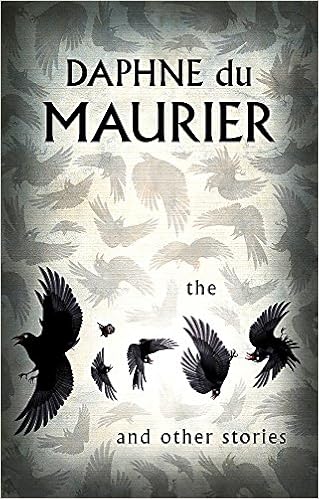

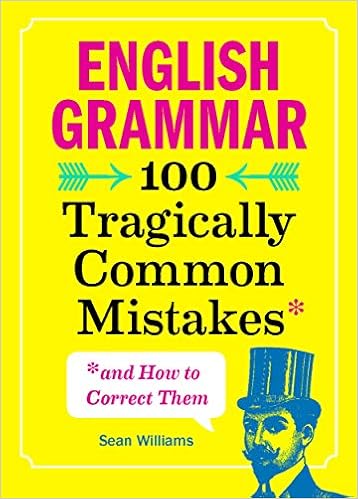
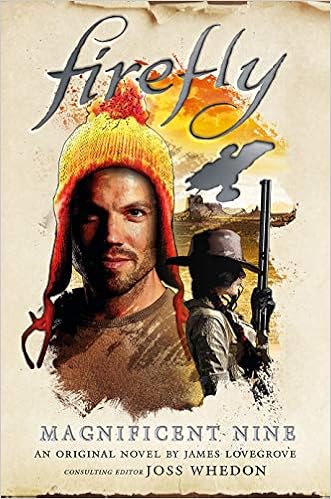
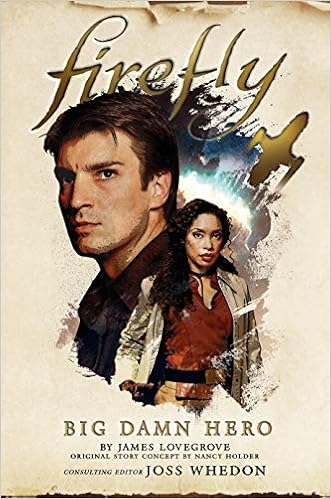
 Unraveling Time
Unraveling Time Desert Wind
Desert Wind Ploughman's Son
Ploughman's Son Ploughman King
Ploughman King The Year the Cloud Fell
The Year the Cloud Fell The Spirit of Thunder
The Spirit of Thunder Shadow of the Storm
Shadow of the Storm The Cry of the Wind
The Cry of the Wind Beneath a Wounded Sky
Beneath a Wounded Sky Cryptogenesis: A Memoir
Cryptogenesis: A Memoir